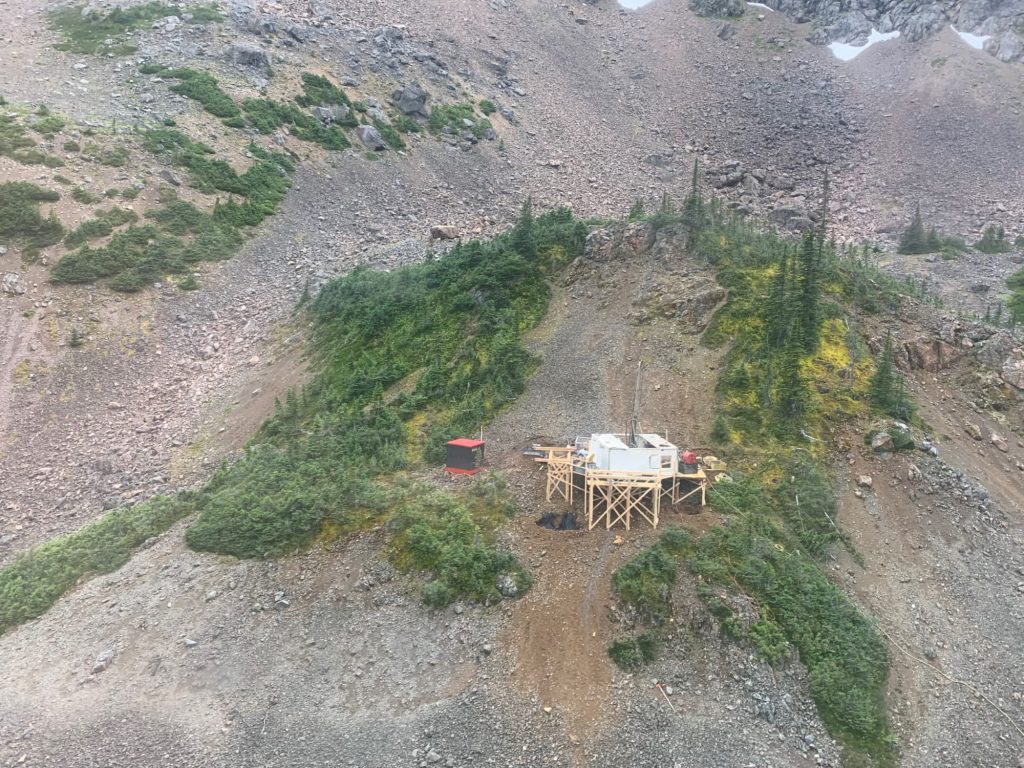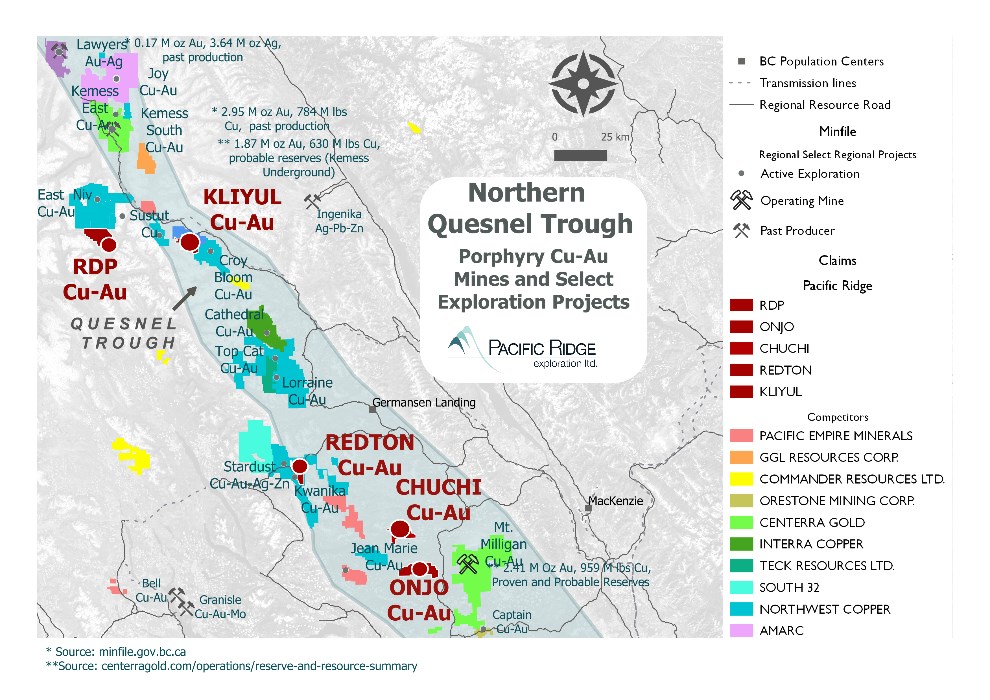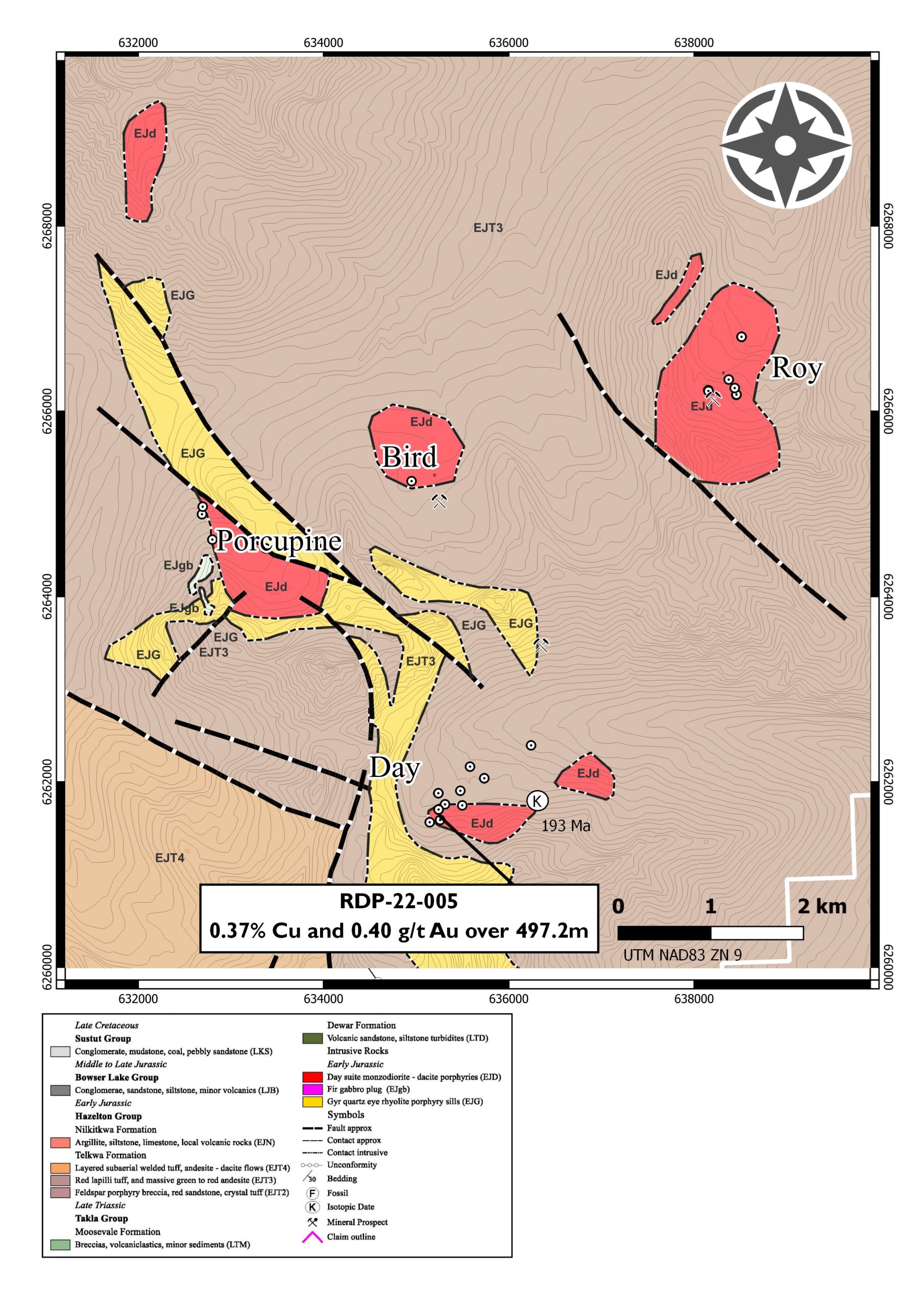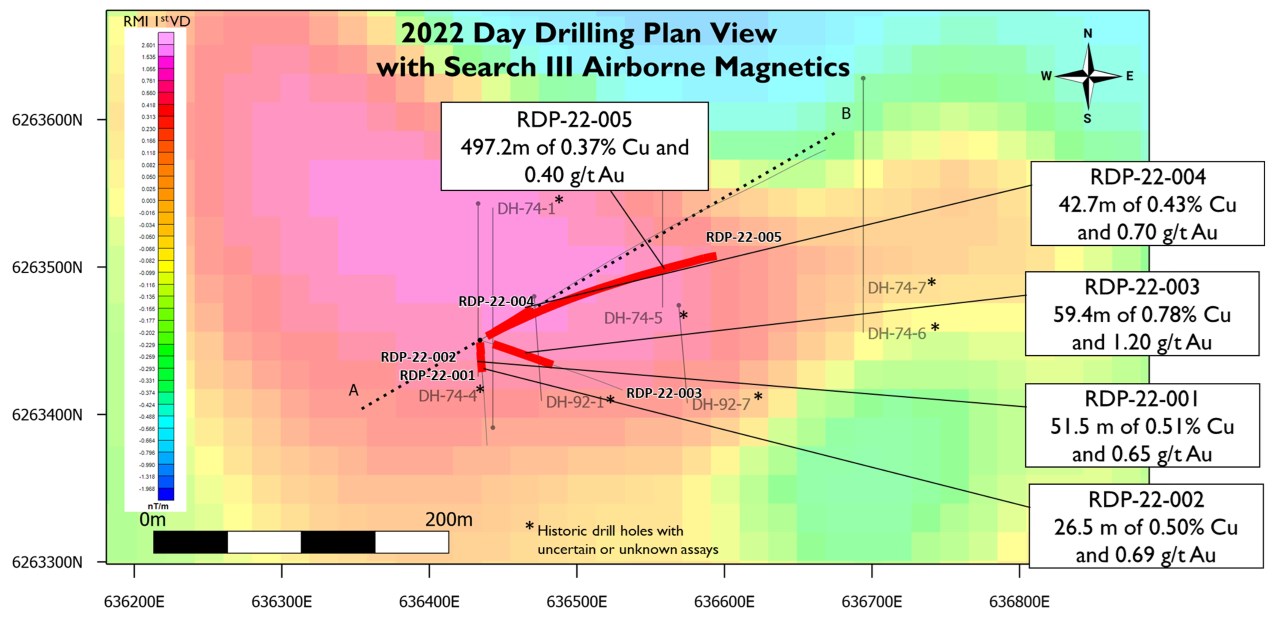Pacific Ridge Intersects High-grade Copper-Gold Mineralization in Every Drill Hole at RDP’s Day Zone Including 59.4 M of 1.68% Copper Equivalent

Pacific Ridge Exploration Ltd. (TSXV: PEX) (OTCQB: PEXZF) (“Pacific Ridge” or the “Company”) is pleased to announce the remaining results from the 2022 drill program completed at the RDP copper-gold project (“RDP” or the “Project”), including drill hole RDP-22-003, which returned 59.4 m of 1.68% copper equivalent (“CuEq”) from the Day Zone. RDP is located in northcentral British Columbia, 40 km west of the Company’s flagship Kliyul copper-gold project (“Kliyul”) (see Figure 1).
Pacific Ridge completed 1,860 m of drilling in six holes at RDP. Holes RDP-22-001 to RDP-22-005 were drilled at the Day Zone and RDP-22-006 at the Roy Zone (see Figure 2). The drill program was funded by Antofagasta Minerals S.A. (“Antofagasta”), a subsidiary of Antofagasta PLC, who can earn a 75% interest in the Project by spending $10,000,000 on exploration over eight years and delivering a preliminary economic assessment report. Last drilled in 2011, this was the Company’s first ever drill program at the Project.
Highlights of the 2022 Exploration Program
- Hole RDP-22-005 intersected 107.2 m of 1.45% CuEq (0.63% Cu, 1.10 g/t Au, and 2.91 g/t Ag) within 497.2 m of 0.68% CuEq (0.37% Cu, 0.40 g/t Au, and 1.6 g/t Ag), from surface (previously reported, see news release dated October 25, 2022, for further information).
- Hole RDP-22-003 intersected 59.4 m of 1.68% CuEq (0.78% Cu, 1.2 g/t Au, and 2.99 g/t Ag) from surface.
- Hole RDP-22-001 intersected 51.5 m of 1.01% CuEq (0.51% Cu, 0.65 g/t Au and 2.59 g/t Ag) from surface.
- The Day Zone mineralization remains open to the east, north, west, and at depth, and may be associated with a late-mineral bounding fault on its south or southwest side.
“We are extremely pleased with the results from our first ever drill program at RDP, especially drill hole RDP-22-005, which returned one of B.C.’s best copper intercepts last year,” said Blaine Monaghan, President & CEO of Pacific Ridge. “Future drilling at RDP will be focused on expanding the mineralized footprint at the Day Zone, which remains open in almost every direction.”
Table 1
2022 RDP Assay Results Summary
1CuEq = ((Cu%) x $Cu x 22.0462) + (Au(g/t) x $Au x 0.032151) + (Ag(g/t) x $Ag x 0.032151)) / ($Cu x 22.0462)
2AuEq = ((Cu%) x $Cu x 22.0462) + (Au(g/t) x $Au x 0.032151)) + (Ag(g/t) x $Ag X 0.032151)) / ($Au x 0.032151)
3Previously announced (see news release dated October 25, 2022)
Commodity prices: $Cu = US$3.50/lb., $Au = US$1,750/oz., and Ag = US$20.00/oz.
Factors: 22.0462 = Cu% to lb. per tonne, 0.032151 = Au g/t to troy oz per tonne, and 0.032151 = Ag g/t to troy oz per tonne.
Recovery is assumed to be 100% – there has been no metallurgical testing on RDP mineralization
Click on the link below for complete assay results for holes RDP-22-001 to RDP-22-006.
Figure 1 RDP Location Map
Figure 2 RDP Target Areas
Discussion of Drill Holes RDP-22-001 to RDP-22-005 at the Day Zone
Pacific Ridge completed five drill holes, totaling 1,392-metres, from a single drill pad at the Day Zone. A single drill pad was used for logistical reasons and to support an initial test of ideas regarding the orientation of the surface showing following prospect scale mapping.
The Day Zone consists of a 100 x 150 m rusty weathering, malachite stained, outcrop protruding from a boulder talus slope. Porphyry Cu-Au-Ag mineralization is hosted in a composite, hornblende-plagioclase sub-porphyritic diorite stock that intruded polymictic volcano-sedimentary rocks of the Hazelton Group (Telkwa Formation). Mineralization at surface is primarily chalcopyrite, with coarse blebby bornite noted in potassic alteration zones. Chalcopyrite occurs as disseminated blebs in groundmass, as disseminated grains on tight fractures, filling the centerline of quartz and quartz-magnetite veins (QMS veins), or as coarse replacements up to 5×10 cm in size.
RDP-22-001 (azimuth 180°, inclination -80°) tested the Day Zone steeply to the south. Potassic altered and mineralized diorite was intersected to 61 m depth followed by late-mineral diorite, andesite and gabbro dykes and magnetite-chlorite altered volcaniclastic andesite host rock to 96 m. From 96-120 m, drilling intersected a phyllic altered and pyrite mineralized sheared tuff-breccia unit and continued in hematite-carbonate altered Telkwa Formation volcaniclastic rocks to end-of-hole. Drilling was shut down at 240 m.
RDP-22-002 (azimuth 180°, inclination -60°) tested the Day Zone shallowly to the south. Potassically altered, Cu-sulfide mineralized and QMS veined diorite was intersected to 48 m. From 48-95 m, a chlorite-sericite altered late-mineral diorite with faulted contacts was encountered. The remainder of the drill hole was in volcaniclastic andesite of the Telkwa Formation and was shut down at 138 m.
RDP-22-003 (azimuth 102°, inclination -45°) tested the continuity of the early-mineral diorite and Cu-sulphide mineralization shallowly to the southeast. Potassically altered, Cu-sulfide mineralized and QMS veined diorite was intersected to 73 m. The remainder of the drill hole was in late-mineral chlorite-sericite altered diorite and was shut down at 141 m.
RDP-22-004 (azimuth 60°, inclination -45°) tested the continuity of the early-mineral diorite and mineralization shallowly to the northeast. Potassically altered, Cu-sulfide mineralized and QMS veined diorite was intersected to 73 m, followed by Cu-sulfide mineralization associated mainly with quartz-carbonate veining to 276 m. From 73 m to 263 m the host rock is described as either a polymictic breccia or breccia related to monzodiorite porphyry obscured by potassic alteration. Hematite is noted with magnetite in the potassic assemblage after 238 m. Host volcaniclastic rocks with phyllic and propylitic alteration overprints were intersected starting at 263 m. Drilling was shut down at 360 m.
RDP-22-005 (azimuth 60°, inclination -70°) tested the geometry of Cu-sulfide mineralized early diorite and magmatic-hydrothermal breccia units more steeply to the northeast. See news release dated October 25, 2022, for further information.
Modelling of drilling results suggest a generally east-west trending, steeply north-dipping porphyry Cu-Au system that remains open to the east, north, west, and at depth (see Figures 3 and 4). The model is preliminary at this stage and not well constrained. The system appears to be cut-off on the south or southwest by a fault structure with late-stage dykes having exploited the same structure.
Figure 3 2022 Day Zone Drilling Plan View with Search III Airborne Magnetics
Figure 4 2022 Day Zone Drilling Cross Section with MVI (Magnetic Vector Inversion) Magnetics
Discussion of Drill Hole RDP-22-006 at the Roy Zone
The Roy Zone is exposed on a 300 m x 200 m bench in a NE-trending composite body of coalescing fine grained plagioclase porphyritic quartz diorite to monzodiorite stocks that intrude feldspar-phyric volcaniclastic and polymictic basal conglomerate of the Hazelton Group (Telkwa Formation). Veins include 0.5-5.0 cm wide, syn-mineral quartz, quartz-magnetite, and centerline chalcopyrite-filled quartz veins, accompanied by K-feldspar alteration envelopes and patchy relict biotite. Sulfide assemblages are dominantly chalcopyrite, chalcopyrite>pyrite and rarely bornite. Most of the mineralization-alteration is concentrated in a WNW-trending structural corridor approximately 100 m wide.
RDP-22-006 (azimuth 190°, inclination -65°) followed up historical drill hole EQ11-01 and tested mineralization of the mapped surface showing at depth. Intrusive units (monzodiorite and diorite) were intersected to 323 m. A patchy potassically altered central diorite from 103 m to 309 m is flanked by magnetite-chlorite cemented hydrothermal breccia units at its northern and southern contacts. This diorite unit contains 10-25% irregular and dismembered QMS veins from 178 m to 292 m hosting pyrite and lesser chalcopyrite. From 323 m, volcaniclastic host rock was encountered to end-of-hole at 468 m.
Drilling results at Roy show similar lateral zoning relationships as at the Day prospect. Cu-sulfide mineralization with trace bornite and QMS veins occurs at near surface to 30 m, followed by chalcopyrite>pyrite mineralization to 108 m, pyrite>chalcopyrite mineralization to 396 m, and pyrite only to 468 m. Quartz-carbonate veins become the dominant vein type after 361 m. This is accompanied by a general downhole decrease in Au:Cu and Au:Ag ratios. Upper-level porphyry and sub-epithermal pathfinder elements are mostly background at Roy suggesting drilling has intersected the deep peripheral flank of a porphyry system. Magnetic inversion modelling of historical aeromagnetic data suggests there may be a west-dipping porphyry stock complex farther east by about 450 m, at the margin of the large underlying magnetic feature at Roy.
About RDP
Located 40 km west of the Company’s flagship Kliyul project, RDP is greater than 10,000 hectares in size and lies within the Stikine Terrane, which is host to numerous significant porphyry deposits in northern British Columbia, including Kemess, Red Chris, Kerr-Sulphurets and Galore Creek. The Project is also in a similar geological environment to NorthWest Copper’s East Niv discovery, which adjoins RDP to the north. The eastern margin of Stikine Terrane in this part of northcentral BC has been underexplored historically and has seen increased exploration activity since its coverage in the 2017 Geoscience BC Search Phase III airborne magnetic and radiometric survey.
RDP contains several porphyry copper-gold targets (Roy, Day, Porcupine, and Bird) that have been explored intermittently since the early 1970’s, including prospecting and mapping, various geochemical surveys, ground- and airborne geophysical surveys, trenching and a limited amount of drilling. The Project is underlain by lower Hazelton Group volcanic and sedimentary rocks (Lower Jurassic) of andesitic and dacitic composition and the Gyr rhyolite porphyry; and by Late Triassic to Early Jurassic plutonic rocks including the Fir gabbro and Roy plutonic suite with porphyritic plugs, sills, and stocks of monzodiorite composition.
QA/QC (Quality Assurance/Quality Control)
Pacific Ridge’s 2022 exploration program was managed by Equity Exploration Consultants Ltd. of Vancouver, B.C. The drill contractor was Dorado Drilling Ltd. of Vernon, B.C. Half-core HQ (63.5 mm) or NQ (47.6 mm) sawed samples from continuous intervals throughout drill holes were sealed on site and shipped to ALS Global Laboratories’ (“ALS”) preparation lab in Kamloops and then to their analytical facility in North Vancouver, BC. Fire assay and multielement analyses were completed at the ALS analytical laboratory in North Vancouver. Drill core was crushed, pulverized and analyzed for 48 elements using a four-acid digest followed by ICP-MS (ME-MS61) with over limits by ore grade four-acid digest followed by ICP-AES (OG62), and with a 30 g sample analyzed for gold by fire assay and atomic absorption finish (Au-AA23). Samples were no smaller than 50 cm and no larger than 2 m in length, respecting changes in lithology and alteration. Blanks and commercially certified reference materials were inserted blind into the sample stream with an overall insertion rate of 5%. Field duplicates representing a quarter core split of the original sample are inserted at 2.5%. Pulp and crush duplicates are inserted at 5% insertion rate by the laboratory. The QAQC results are reviewed as batches once returned from the laboratory and appropriate actions are implemented where required. The QA/QC results for drill holes from the 2022 drilling program at RDP are acceptable.
About Pacific Ridge
Our goal is to become British Columbia’s leading copper-gold exploration company. Pacific Ridge’s flagship project is the Kliyul copper-gold project, located in the prolific Quesnel Trough, approximately 50 km southeast of Centerra Gold Inc.’s Kemess mine. In addition to Kliyul, the Company’s project portfolio includes the RDP copper-gold project (optioned to Antofagasta Minerals S.A.), the Chuchi copper-gold project, the Onjo copper-gold project, and the Redton copper-gold project, all located in British Columbia.
On behalf of the Board of Directors,
“Blaine Monaghan”
Blaine Monaghan
President & CEO
Pacific Ridge Exploration Ltd.
Corporate Contact:
Blaine Monaghan
President & CEO
Tel: (604) 687-4951
www.pacificridgeexploration.com
https://www.linkedin.com/company/pacific-ridge-exploration-ltd-pex-
https://twitter.com/PacRidge_PEX
Investor Contact:
G2 Consultants Corp.
Telephone: +1 778-678-9050
Email: ir@pacificridgeexploration.com
Neither the TSX Venture Exchange nor its Regulation Services Provider (as that term is defined in the policies of the TSX Venture Exchange) accepts responsibility for the adequacy or accuracy of this release.
The technical information contained within this News Release has been reviewed and approved by Gerald G. Carlson, Ph.D., P.Eng., Executive Chairman of Pacific Ridge and Qualified Person as defined by National Instrument 43-101 policy.
Forward-Looking Information: This release includes certain statements that may be deemed “forward-looking statements”. All statements in this release, other than statements of historical facts, which address exploration drilling and other activities and events or developments that Pacific Ridge Exploration Ltd. (“Pacific Ridge”) expects to occur, are forward-looking statements. Forward-looking statements in this news release include future drilling at RDP will be focused on the Day Zone. Although Pacific Ridge believes the expectations expressed in such forward-looking statements are based on reasonable assumptions, such statements are not guarantees of future performance and actual results or developments may differ materially from those forward-looking statements. Factors that could cause actual results to differ materially from those in forward looking statements include market prices, exploration successes, and continued availability of capital and financing and general economic, market or business conditions. These statements are based on a number of assumptions including, among other things, assumptions regarding general business and economic conditions, that one of the options will be exercised, the ability of Pacific Ridge and other parties to satisfy stock exchange and other regulatory requirements in a timely manner, the availability of financing for Pacific Ridge’s proposed programs on reasonable terms, and the ability of third party service providers to deliver services in a timely manner. Investors are cautioned that any such statements are not guarantees of future performance and actual results or developments may differ materially from those projected in the forward-looking statements. Pacific Ridge does not assume any obligation to update or revise its forward-looking statements, whether as a result of new information, future events or otherwise, except as required by applicable law.





